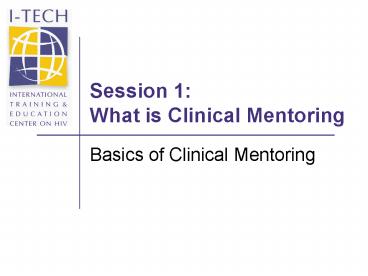Session 1: What is Clinical Mentoring - PowerPoint PPT Presentation
Title:
Session 1: What is Clinical Mentoring
Description:
Understand the rationale for, and objectives of, clinical mentoring ... Takes a 'back-seat' approach to teaching, avoiding extensive lectures ... – PowerPoint PPT presentation
Number of Views:366
Avg rating:3.0/5.0
Title: Session 1: What is Clinical Mentoring
1
Session 1What is Clinical Mentoring
- Basics of Clinical Mentoring
2
Learning Objectives
- By the end of this session, participants will be
able to - Define clinical mentoring and distinguish it from
supportive supervision - Understand the rationale for, and objectives of,
clinical mentoring - Outline characteristics of effective mentors
- Understand challenges to mentoring
3
Partner Brainstorm
- What Is Clinical Mentoring?
4
Clinical Mentoring Definition
- A sustained, collaborative relationship in which
a highly experienced health care provider guides
improvement in the quality of care delivered by
other providers and the health care systems in
which they work.
5
I-TECHs Definition of What Clinical Mentors Do
- I-TECH approach includes 5 key components
- Building relationships
- Identifying areas for improvement
- Responsive coaching and modeling of best
practices - Advocating for environments conducive to good
patient care and provider development - Collecting and reporting on data
6
Why Clinical Mentoring?
- Decentralization of HIV care and ART
- Strengthening the district health care system
- Task-shifting
- Transitioning to chronic HIV care
- Standardized content and care pathways
- Continuing education
7
Components of Mentoring (1)
8
Components of Mentoring (2)
9
Components of Mentoring (3)
10
Components of Mentoring (4)
11
Components of Mentoring (5)
12
Components of Mentoring (6)
13
Activity Mentoring vs. Supportive Supervision
(1)
- What activities/duties fall in each category?
- Which fall into both categories?
14
Mentoring vs. Supportive Supervision (2)
Supportive supervision
- Space, equipment, forms
- Supply chain management
- Training, staffing, other human resource issues
- Entry points
- Patient satisfaction
- Patient flow and triage
- Clinic organization
- Patient monitoring and record-keeping
- Case mgmt. observation
- Team meetings
- Review of referral decisions
- Clinical mentoring
- Clinical case review
- Bedside teaching
- Journal club
- Morbidity and mortality rounds
- Assist with care and referral of complicated
cases - Available via distance communication
15
Mentor ? Preceptor
- Mentor
- Guides mentee through entire course of training
physical exam to advanced, complex, end-of-life
care - 2-way discussion with open-ended questions
- Teaches by modeling, not only intellectual skills
but also empathy/ compassion
- Preceptor
- Works alongside student, directs his/her learning
by telling him/her what to look for, how to look
for it - Telling, not showing
16
Characteristics of a Good Mentor
- Adept at physical diagnosis
- Working knowledge of possible diagnoses and
issues that may need addressing - Enthusiastic and comfortable incorporating
diverse situations/experiences into teaching - Takes a back-seat approach to teaching,
avoiding extensive lectures - Allows mentor to explore and learn on his/her own
- Understanding of clinical systems to address
systemic issues
17
Characteristics of Effective Mentorship
Relationships
- Relationship is warm, safe, respectful, trustful
- Both mentor and mentee want to be involved in
mentoring relationship - Mentor listens to learner and the learner knows
it - Mentor/mentee are able to process
misunderstandings - Continuity of the relationship over time
- Power is shared
- Learning is two-way mentor is interested in
learners ideas
18
Activity
- What are some challenges in conducting
- clinical mentoring?
19
Challenges to Mentoring (1)
- Obstacles to health care working (HCW) learning
- Stress due to intra-clinic factors (e.g., heavy
patient load, disorganization) - Personal distractions
- HCWs stressed by mentors presence in clinic
20
Challenges to Mentoring (2)
- Defensiveness
- Putting on ones best show, not the typical
show, for the visiting mentor - Bad (as opposed to best) practices
- Varying availability of resources from clinical
site to clinical site - Clinical site infrastructure and systems in need
of mentoring
21
Key Points
- Clinical mentoring seeks to strengthen district
health care systems by providing continuing
education to HCWs, and working towards creating
more efficient clinical settings. - Clinical mentoring involves relationship-building,
identifying areas for improvement, coaching and
modeling, advocacy, and data collection and
reporting. - Effective mentors are respectful, teach and
learn, are adept at physical diagnosis, and
enthusiastic about teaching.































